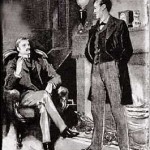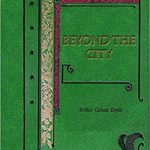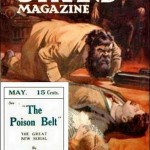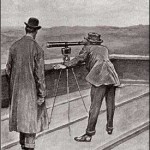“Card-room, as per usual,” quoth the clean-shaven warrior. He looked after the retreating figure of his late companion with anything but a pleasant expression upon his face. The young man happened to glance round as he was half-way down the street, on which the major smiled after him paternally, and gave a merry flourish with his stick.
As the old soldier stood on the top of the club steps, pompous, pigeon-chested, and respectable, posing himself as though he had been placed there for the inspection of passers-by as a sample of the aristocracy within, he made several attempts to air his grievances to passing members touching the question of the expectant Jorrocks and the missing purse. Beyond, however, eliciting many sallies of wit from the younger spirits, for it was part of the major’s policy to lay himself open to be a butt, his laudable perseverance was entirely thrown away. At last he gave it up in disgust, and raising his stick hailed a passing ‘bus, into which he sprang, taking a searching glance round to see that no one was following him. After a drive which brought him to the other side of the City, he got out in a broad, busy thoroughfare, lined with large shops. A narrow turning from the main artery led into a long, dingy street, consisting of very high smoke-coloured houses, which ran parallel to the other, and presented as great a contrast to it as the back of a painting does to the front.
Down this sombre avenue the major strutted with all his wonted pomposity, until about half-way down he reached a tall, grim-looking house, with many notices of “apartments” glaring from the windows. The line of railings which separated this house from the street was rusty, and broken and the whole place had a flavour of mildew. The major walked briskly up the stone steps, hollowed out by the feet of generations of lodgers, and pushing open the great splotchy door, which bore upon it a brass plate indicating that the establishment was kept by a Mrs. Robins, he walked into the hall with the air of one who treads familiar ground. Up one flight of stairs, up two flights of stairs, and up three flights of stairs did he climb, until on the fourth landing he pushed open a door and found himself in a small room, which formed for the nonce the “little place” about which he was wont at the club to make depreciatory allusions, so skilfully introduced that the listener was left in doubt as to whether the major was the happy possessor of a country house and grounds, or whether he merely owned a large suburban villa. Even this modest sanctum was not entirely the major’s own, as was shown by the presence of a ruddy-faced man with a long, tawny beard, who sat on one side of the empty fire-place, puffing at a great china-bowled pipe, and comporting himself with an ease which showed that he was no casual visitor.
As the other entered, the man in the chair gave vent to a guttural grunt without removing the mouthpiece of his pipe from between his lips; and Major Clutterbuck returned the greeting with an off-handed nod. His next proceeding was to take off his glossy hat and pack it away in a hat-box. He then removed his coat, his collar, his tie, and his gaiters, with equal solicitude, and put them in a place of safety. After which he donned a long purple dressing-gown and a smoking-cap, in which garb he performed the first steps of a mazurka as a sign of the additional ease which he experienced.
“Not much to dance about either, me boy,” the old soldier said, seating himself in a camp-chair and putting his feet upon another one. “Bedad, we’re all on the verge. Unless luck takes a turn there’s no saying what may become of us.”
“We have been badder than this before now many a time,” said the yellow-bearded man, in an accent which proclaimed him to be a German. “My money vill come, or you vill vin, or something vill arrive to set all things right.”
“Let’s hope so,” the major said fervently. “It’s a mercy to get out of these stiff and starched clothes; but I have to be careful of them, for me tailor—bad cess to him!—will give no credit, and there’s little of the riddy knocking about. Without good clothes on me back I’d be like a sweeper without a broom.”
The German nodded his intense appreciation of the fact, and puffed a great blue cloud to the ceiling. Sigismond von Baumser was a political refugee from the fatherland, who had managed to become foreign clerk in a small London firm, an occupation which just enabled him to keep body and soul together. He and the major had lodged in different rooms in another establishment until some common leaven of Bohemianism had brought them together. When circumstances had driven them out of their former abode, it had occurred to the major that by sharing his rooms with Von Baumser he would diminish his own expenses, and at the same time secure an agreeable companion, for the veteran was a sociable soul in his unofficial hours and had all the Hibernian dislike to solitude. The arrangement commended itself to the German, for he had a profound admiration for the other’s versatile talents and varied experiences; so he grunted an acquiescence and the thing was done. When the major’s luck was good there were brave times in the little fourth floor back. On the other hand, if any slice of good fortune came in the German’s way, the major had a fair share of the prosperity. During the hard times which intervened between these gleams of opulence, the pair roughed it uncomplainingly as best they might. The major would sometimes create a fictitious splendour by dilating upon the beauties of Castle Dunross, in county Mayo, which is the headquarters of all the Clutterbucks. “We’ll go and live there some day, me boy,” he would say, slapping his comrade on the back. “It will be mine from the dungeons forty foot below the ground, right up, bedad, to the flagstaff from which the imblem of loyalty flaunts the breeze.” At these speeches the simple-minded German used to rub his great red hands together with satisfaction, and feel as pleased as though he had actually been presented with the fee simple of the castle in question.
“Have you had your letter?” the major asked with interest, rolling a cigarette between his fingers. The German was expecting his quarterly remittance from his friends at home, and they were both anxiously awaiting it.
Von Baumser shook his head.





